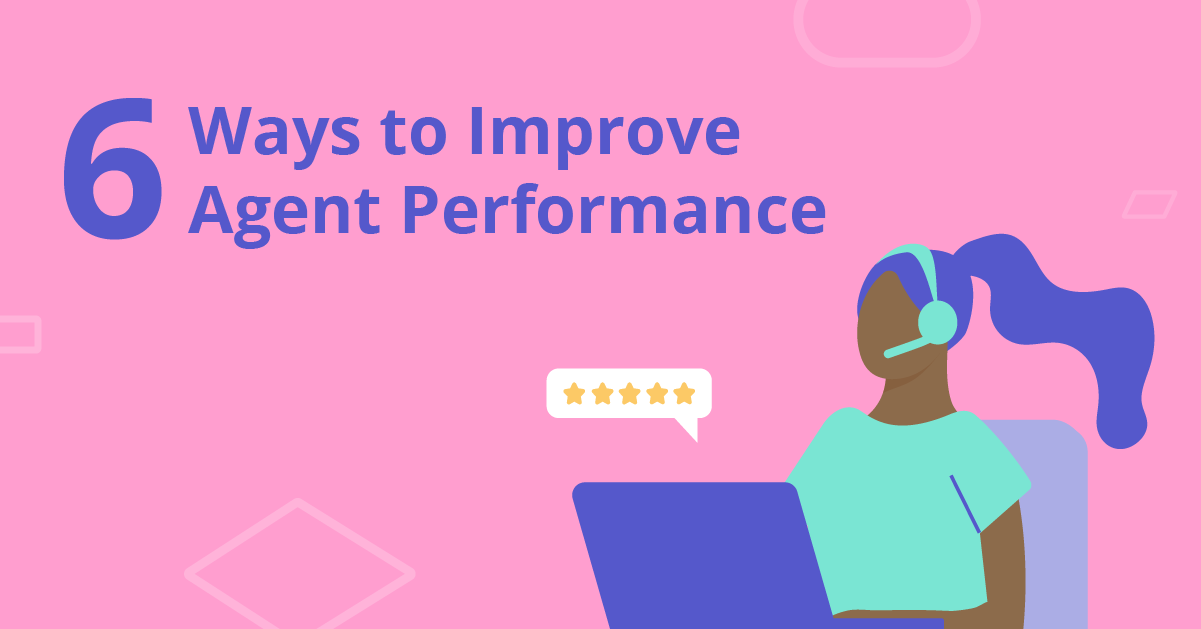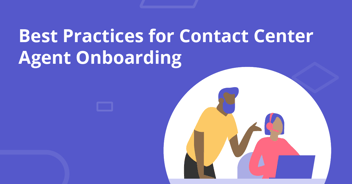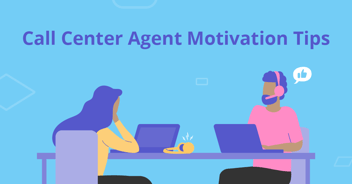6 Ways to Improve Call Center Agent Performance

You’ve assembled a team of exceptional agents to be the voice of your organization.
So, why aren’t they performing to their potential?
Any oversight in the onboarding process, training, or technology can negatively impact agent performance. And unfortunately, customers bear the brunt of it.
Improving performance can be a challenging task but considering that the cost of replacing an agent ranges from $10,000 to $20,000, it’s in your best interest to prioritize the improvement of existing agents rather than replacing them with someone else.
There are many reasons why an agent isn’t keeping up. We’ll discuss the most likely causes and provide valuable tips on improving agent performance in your call center.
Why is improving call center agent performance important?
From a customer’s point of view, call center agents are the organization. They’re the first point of contact when problems occur. And since more than half of customers would abandon a company after a single unsatisfactory experience, a call center simply cannot afford to maintain subpar performance levels.
Poor performance not only contributes to increased attrition rates and lower proficiency levels but also incurs substantial financial costs and requires significant time investment in the onboarding process when replacing agents. It becomes increasingly difficult to sustain a culture of excellence when there is constant turnover in the team.
Moreover, agents have a direct impact on the key performance metrics of a call center, and underperformance drags down these crucial numbers.
That's why empowering agents with the tools and resources that they need to thrive is the most important step for any call center to take to improve performance and deliver exceptional customer service.
What are the reasons for low call center agent performance?
- Difficulty finding information—Lack of access to efficient software for quick and seamless information retrieval results in prolonged wait times, frequent transfers, and a growing sense of customer frustration. Agents, too, experience frustration due to fragmented information across multiple systems, as they spend too much time searching instead of supporting the customer.
- Too many systems—Navigating through multiple systems on multiple screens makes the job far more challenging than it needs to be.
- Inefficient training and coaching—Traditional classroom-style training often spans weeks or even months, leading to loss of productive time. And when agents aren’t provided with regular feedback, they are left feeling uncertain about their role which results in frequent errors.
- Performance metrics unclear—Agents must understand exactly what is expected of them, how they can achieve those goals, and why they matter.
- Lack of career advancement opportunities—When call center leaders aren’t transparent about an agent’s position within the organizational chart and their role in contributing to overall success, it hinders their motivation and engagement.
- Agent burnout—All of the factors listed above have the potential to contribute to burnout. When an agent is mentally exhausted, they may find themselves merely going through the motions, contemplating an exit strategy, or both.
How to improve agent performance in your call center
Achieving a positive customer experience rests upon the ongoing improvement of agent performance.

Here are the most effective strategies.
1. Use the best technology to simplify work
Outdated and confusing technology leads to frustration for the agent and unnecessary friction for the customer journey.
When agents are provided with an easy-to-use knowledge management system, they’re able to understand the exact steps they need to take during a call, which increases both confidence and productivity.
With simplified processes and easy information retrieval, agents have more time to focus on the customer interaction, enhancing the overall quality of service provided and reducing escalations caused by information gaps.
Bonus tip: Instead of using text-based knowledge which is time-consuming to read and scroll through, consider implementing a visual knowledge management system. Using visuals to guide agents through complex processes allows them to locate and execute each required step with precision and ease.
2. Make use of automation
Automating predictable, routine tasks provides agents with the time and energy they need to deliver personalized customer interactions.
Automating processes reduces the clutter of having multiple applications open at a time on several different screens. Unifying the agent experience by integrating knowledge within the system that agents spend most of their time, such as their CCaaS or CRM, allows critical information to become readily accessible without the need for additional applications. This eliminates unnecessary distractions and allows agents to focus solely on the customer.
AI technology such as conversation guidance helps agents quickly find information in crowded knowledge bases and delivers it to them in real-time. It can also give suggestions and provide feedback based on the interaction, reducing agent effort and improving the customer’s experience.
3. Improve the onboarding process
Before agents can provide customers with optimal service, they must first complete the onboarding process. Unfortunately, this can be time-consuming and agents often leave the call center just as their performance reaches an acceptable level.
While basic classroom training provides foundational knowledge of processes, it often falls short in effectively preparing agents to handle authentic, on-the-job scenarios.
That is where scenario-based learning proves to be a game-changer. By placing new hires in real-life situations immediately, it reduces training time and engages agents from day one. This approach enhances learning retention and equips agents with the necessary skills to handle diverse customer interactions before they move to production.
4. Schedule personalized training and coaching sessions
Agents that are provided with continuous learning opportunities will have a broader skillset and more knowledge about the organization and services which it offers.
Regular coaching sessions where agents are given personalized feedback based on their strengths and weaknesses are invaluable for developing a deep understanding of the specific performance indicators agents need to improve and strategies to do so. These coaching sessions help agents identify their accomplishments and the potential they hold for a successful future within the organization. They also give agents the opportunity to provide their own feedback for call center improvement.
Training is ongoing, not just one-and-done. In a culture of continuous learning where processes change, updates are created, and improvements are implemented, agents should remain well-informed about these changes. Regular training sessions are also great for improving team collaboration and sharing knowledge among colleagues.
5. Establish and monitor clear KPIs
Agents need to understand which metrics are being evaluated so that they can target their efforts toward improvement. Metrics should be clearly stated, aligned with the goals of the call center, and have a specific purpose behind them.
Monitor and provide feedback that includes practical measurements for progress. But don’t just focus on the hard numbers, ensure that equal attention is paid to soft skills and human-centric interaction as well.
If an employee isn’t achieving their goals, adopt a proactive approach by thoroughly investigating the circumstances surrounding their poor performance before resorting to penalties. This approach gives agents a fair chance to understand and correct their mistakes.
6. Offer incentives for exceptional performance
Agents should feel a genuine sense of recognition and appreciation for their accomplishments.
Money is undoubtedly valuable, but perks are also appreciated, such as an extra break during the workday or even some dedicated time off.
By rewarding outstanding performance, you acknowledge the significant impact agents have in the call center and provide incentive for ongoing growth and improvement.
Improve your call center agent performance
When a call center’s performance needs improvement, start with customer-facing assets—the agents.
By equipping agents with the right tools and resources that they need to succeed, such as an intuitive knowledge management platform and personalized training sessions, agents will feel more confident and motivated by their work.
Without a doubt, performance will improve, and so will customer satisfaction.


